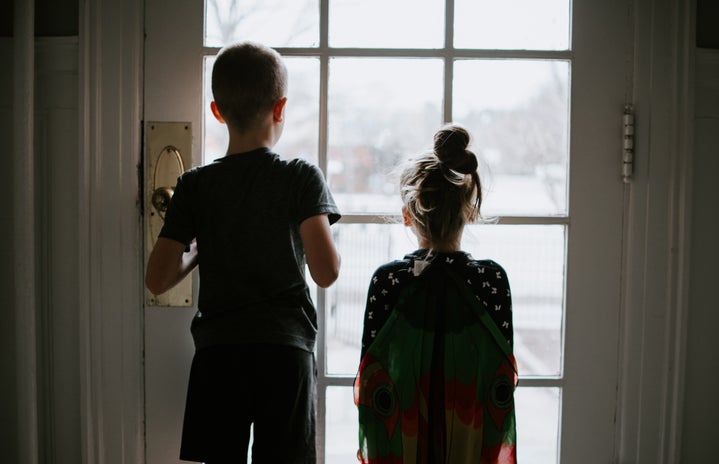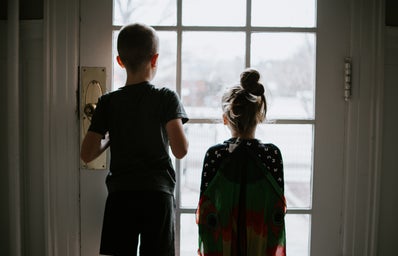When I was in elementary school in the 2010s, my parents gave me 30 minutes of iPad time on weekends. This was my first introduction to the internet and I spent all my time watching YouTube videos, mainly from family creators like Ellie and Jared, Bratayley and Aspyn and Parker. I loved the lifestyle content and the chance to get an inside look into their daily lives. It was exciting to watch a video about a new house, pet or even child.
As I grew up and started consuming other types of content, these creators remained a part of my life. While I did not watch their videos as often, I would check in occasionally to see their development. By the time I reached high school, I started to think more deeply about minors accessing social media.
After the birth of supermodel Gigi Hadid and singer Zayn Malik’s daughter, I was interested in watching the child of two A-list celebrities grow up. However, the couple made a unique choice not to post their daughter on social media and even went as far as to ask paparazzi to blur her face if they were publishing images of the family. They also waited to announce her name, Khai, for a couple of months to further protect her privacy.
Their decision caused me to pause. It felt like the first time celebrities of their status chose to protect their child’s privacy to this extent. It is a starkly different choice when compared to the likes of the Kardashians who post their young children on social media regularly. Kim Kardashian even shares a TikTok account with her eldest daughter North, 11, which boasts 19 million followers.
As a teen, I developed an obsession with all things pop culture through reading magazines like Tiger Beat and J-14 and watching media content. I felt like I had significant access to the personal lives of social media influencers and young celebrities. I, like many others, learned to desire this information.
But following Hadid and Malik’s decision, I have started to notice a shift when thinking about the privacy of minors across all social media platforms. There are seemingly two sides: parents who plaster every intimate detail of their child’s life on the internet and those who hide their kids from public view.
On one side, you have The Labrant Fam whose channel racks up millions of views on each post. They offer an intimate view into their young family of six, with videos documenting their oldest daughters’ baptism to their sons’ surgery. Clearly, they are not worried about the future impact of this overexposure of their children.
On the other hand, there are creators who post about their families and parenthood without subjecting their children to the hot lights of public scrutiny. TikTok influencers like Mada Graviet, Bobbi Althoff and Maia Knight, who all once posted their young children, now opt to either cover their faces or limit how much of the video their child appears in.
More and more, social media parents are removing their children from their content. There seems to be a new awareness of the reach that content has. The reality is, there are dangerous adults on the internet. Posting your child can make them susceptible to viewership from shady individuals. One mother named Jacquelyn has a TikTok account featuring her 4-year-old daughter, Wren, that has almost 17 million followers. Rather than her mom being in the content, it almost completely revolves around Wren. This has stirred up controversy with many expressing concern that Jacquelyn is exploiting her daughter for money. Additionally, many have noticed troubling comments in which child predators are sexualizing the young girl. Jacquelyn has acknowledged the concern of others but does not seem to reciprocate the worry as she has continued to post her daughter.
In a Cosmopolitan article, one parenting influencer said that she realized she needed to take images of her kids off Instagram after she imagined putting them on a stage in front of hundreds of strangers. She knew they would be uncomfortable and felt that social media was no different. “I just woke up one day and thought, What am I doing,” said the mother.
I worry greatly for the futures of these young influencers because they are being plastered all over the internet, but usually are too young to consent to this content. When I was just 11, I got my first social media accounts. My only followers were friends and family yet I still cringe thinking about some of the things I had posted. I can only imagine the embarrassment I would feel if those posts went out to millions of fans. It really feels like these social media parents do not always have their children’s best interests in mind.
Social media has become a job. Starring in content is an intense thing to add to the daily lives of children when they are already trying to balance school and extracurriculars. These kids are likely seeing firsthand the financial benefits of this type of content for their family. Sponsorships can provide life-changing amounts of money depending on the following the content creator has.
While many parents claim that they limit filming if their children ask and cut out anything they do not want on the internet, it is likely that many children feel an obligation. Developmental psychologist John Oates told NPR that “children are almost inevitably disempowered if an adult asks them to do something.” Many of them might also agree to have something posted as a child that they will be humiliated by when they are older.
The internet seems to love family and child content. Many social media users find comfort in knowing that others are experiencing the same things as them. But when you realize all that goes on behind closed doors in social media families, it is evident that there is a high likelihood that these children could be at risk of overexposure with no ability to consent. I used to enjoy this content, but now I cannot help but worry about the long-term safety of children who are being posted on the internet. Parents must limit the exposure of their children on social media and continue to reassess the risks of posting minors.


